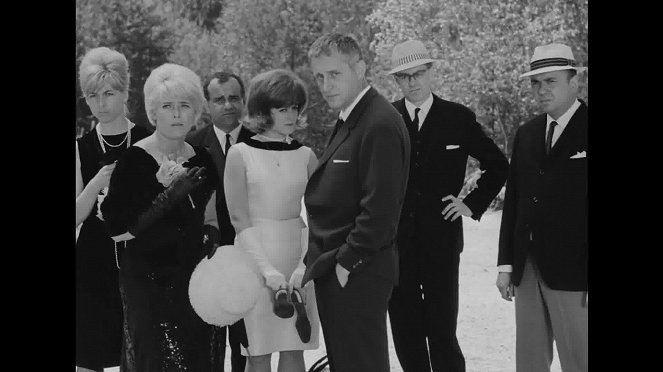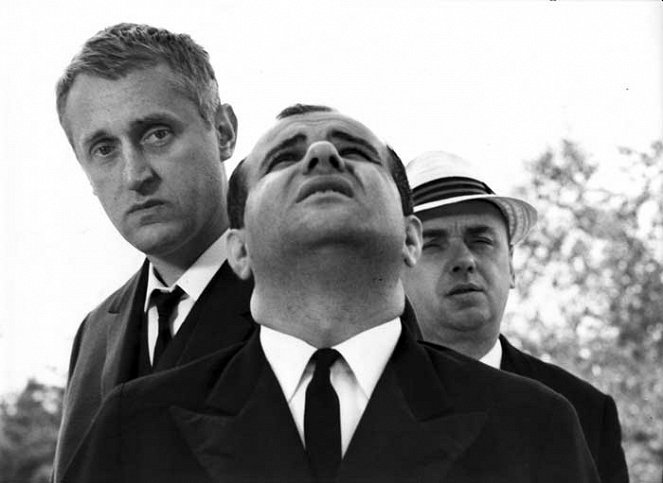Regie:
Jan NěmecKamera:
Jaromír ŠofrMusik:
Karel MarešBesetzung:
Helena Pejšková, Jana Prachařová, Zdena Salivarová-Škvorecká, Pavel Bošek, Karel Mareš, Evald Schorm, Jan Klusák, Jiří Němec, Ivan Vyskočil (mehr)Inhalte(1)
It is a summer day. Several people in good humour are having a snack on a meadow. Josef is meticulously polite, Karel sips wine and keeps praising democracy, František proves to be a good companion, Eva and Marta are jolly girls. The only married couple is a talkative blonde and her taciturn and a bit withdrawn husband. After the snack, the company makes up, changes into cocktail dress and sets off to attend the birthday party of a high functionary. On a forest path, they are surrounded by a group of weird men. Rudolf, the leader of the gang, is seemingly sincere but in fact rather arrogant and aggressive. He divides the men and women into two groups and launches some kind of interrogation. Josef turns servile, Karel protests a little, becoming the target of Rudolf's assaults and minor violence. The host appears in between the trees in a white tuxedo, shouting Rudolf down but at the same time claiming him as his adopted son. All the visitors tenaciously pretend that everything was just a joke and seat themselves by set-up tables. The blonde weeps because her husband has left. He did not enjoy the company where no one likes anybody. The host feels offended. Rudolf decides to make everything right and sends his men headed by a dog-hunter to find the husband, arming himself with a gun. The subsequent man-hunt involves most of the guests. Those who remain put the candles off, sit by the tables in puzzlement and listen to the increasingly loud barking of a dog. (Verleiher-Text)
(mehr)Videos (3)
Kritiken (4)
A shining example of why I don't really like allegories. Not that they have nothing to say, but they do it so stubbornly that I feel embarrassed for them. Although the political climate has changed over the past half-century, a viewer who knows what they're getting into can easily imagine all the festivities, moods, tricks, the flaring up and dying down. It is precisely because of this incessant dense spasmodic semi-pathos that I cannot properly laugh or be shocked by Vít Klusák's remarkable post mortem. It must be said, however, that he himself is a soldier in the field, and the picnickers in particular, whether intentionally or not, are simply dreadful with their amateurish recitation. With this it is with pleasure that I am definitively done with Jan Němec.
()
The Party and the Guests is a very unconventional film that is certainly not lost in the field of parables in 1960’s Czechoslovak cinema. The constant presence of a kind of absurdity and the endless asking of the question Why? How? Where? When?, to which perhaps there is no clear answer – this film plays with the viewer and leaves them free for interpretation. All in all, a noteworthy piece of filmmaking, which, although it didn't impress me as much as other users, I can still recommend.
()
Intellectual puzzle about the technology of power and manipulation of individuals, which became a cult affair thanks to the fact that two years later the Soviet invasion came. The film story about a feast and uninvited visitors perfectly captured the gloomy mood of that time. Interesting dialogues and Orwellian-Kafkaesque atmosphere. Strong final scene, when the search for the lost guest, who obviously does not care for company, turns into a merciless pursuit of an outcast. Overall impression: 95%. The film is worth watching, if only because of its atypical cast.
()
I've never been much for this cannibalistic parable, but I do have a giant soft spot for the new-wave obliteration of archetypes of a Czech character using non-actors. The strange unnatural feeling of watching it can be compared to the feeling of watching scary horror movies. After all, how many points of contact can the film The Party and the Guests have with the cannibalistic feast in Texas Chainsaw Massacre? The statuette for the most charming bimbo of the Czechoslovak New Wave goes to Helena Pejšková. She takes over from Hana Brejchová.
()



Werbung